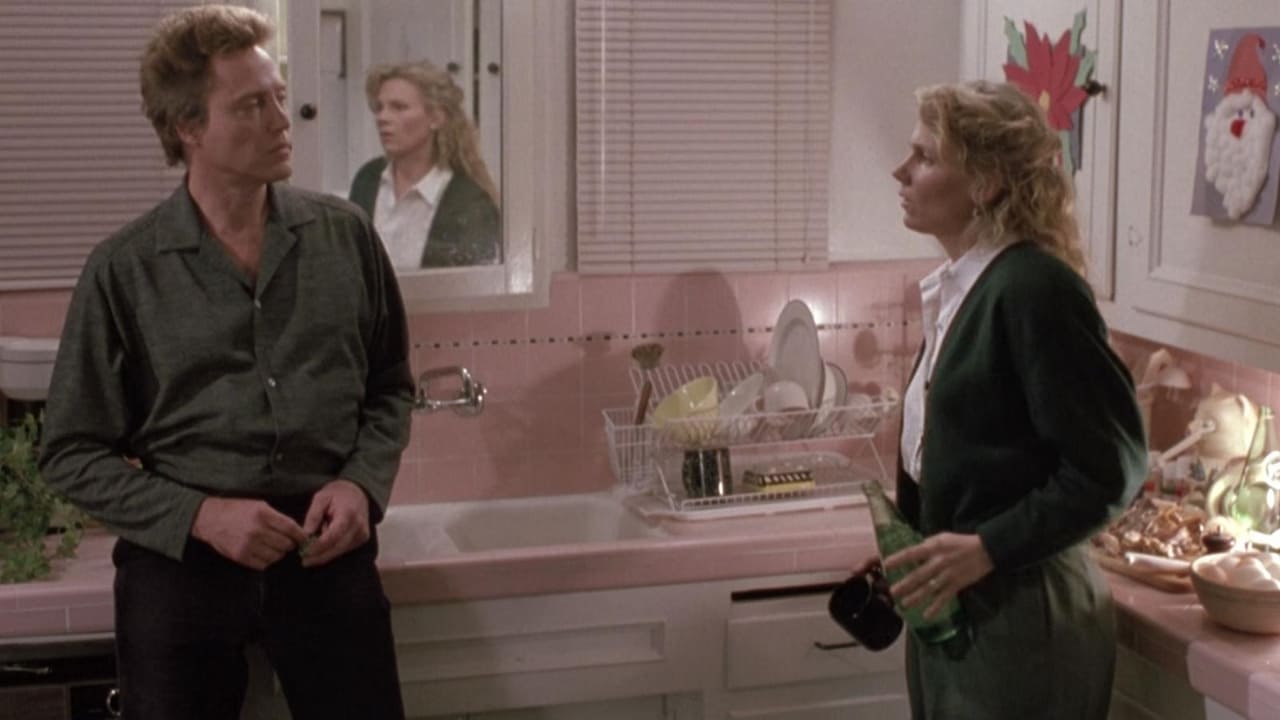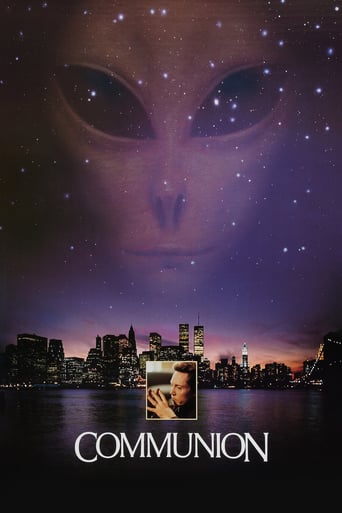

Dreadfully Boring
... View MoreAmazing worth wacthing. So good. Biased but well made with many good points.
... View MoreGreat movie. Not sure what people expected but I found it highly entertaining.
... View MoreWorth seeing just to witness how winsome it is.
... View MoreFrom the writer of "Wolfen" and "The Hunger", two somewhat awkward but nevertheless genuine horror tales, comes this truly outlandish and unclassifiable amalgam of Sci-Fi, thriller and family drama that I still haven't figured out how to properly rate even though I saw it several days ago and did a whole lot of contemplating since. Whitley Strieber, who turned his own novel into a screenplay and co-produced the film, unceasingly claims that "Communion" is based on his very own experiences as being the target of alien abduction and examination. Now this given could easily be dismissed as a cuckoo and sensational gimmick to promote the film, but simultaneously you can't deny that Strieber and director Philippe Mora ("The Beast Within", "The Howling II") attempted – and mainly succeeded – to insert a lot more psychological depth and feeling into this film than usually the case with alien movies. "Communion" is, above all, an extremely weird film and undeniably one that provokes thoughts and opinions that go far beyond the experiences you usually have when watching late 80's movies that deal with extraterrestrial encounters. The author Whitley Strieber is depicted by Christopher Walken – I'll get back to his unforgettable performance later – and the movie begins somewhere early October 1985. During a series of recesses at their country cabin, whether with friends or just with his family, Whitley has "meetings" with two types of alien visitors – the stereotypical large black-eyed ones and little blue monsters – that thoroughly subject him to painful and psychologically devastating examinations. Since Whitley doesn't recall these meeting but obviously alter his mental state of mind, he eventually agrees to relive them via hypnosis sessions. The revelations that come to the surface during these sessions are amazing and fantastic, to say the least This film's greatest trump is inarguably how it forces you to identify with the supportive characters. Not the protagonist himself, as he's obviously a character you can't easily relate to, but his wife or his doctor. Personally, I'm not a "believer" in extraterrestrial life myself, but that doesn't matter because you are only supposed to accept that Whitley Strieber strongly believes all the ordeals that he's hallucinating about. It's quite remarkable how Strieber and Mora manage to put the emphasis on the impact that Whitley's behavior has on his social life, rather than on the actual alien encounters itself. I haven't read it myself, but a friend of mine assured me that the novel digs even deeper into the psychological aspects, so if you're into complex protagonist portrayals you might want to check out the book. If half of the film's power relies on atmosphere, than the other half definitely relies on Christopher Walken's performance! Walken is famous for his outrageous performances and eccentric characters, but he truly surpasses himself as Whitley Strieber. The stereotypical maniac and certifiable crazy person that you know as Christopher Walken – and how he's often imitated by fellow celebrities like Kevin Pollack and Kevin Spacey – fully came to life on the set of "Communion", I presume. He yells, stares creepily, pauses between words and pulls petrifying faces almost like he's spoofing his own personality. In an attempt to appeal to an as versatile as possible audience, "Communion" loses a lot of its credibility and ingenuity near the end, with sequences that are just exaggeratedly demented and special effects that ruin the surreal ambiance. The last fifteen minutes are overlong and sorely disappointing. Also, on a lesser important note, you better not have seen the pilot episode of "South Park" too many times, otherwise you can't help comparing Whitley Strieber's alien encounters with the anal probes that Eric Cartman had.
... View More-- The Book:I just read the book last month, and it was a very anticipated read (with me having seen the movie years prior and the book being a best seller and all). And in this case, I wasn't all that thrilled after reading it. Don't get me wrong, it's a great book. Whitley has a clever writing-style. He fights a constant psychological battle, on the one hand coming up with evidence that he really was abducted by aliens, while otherwise trying to refute the experience with other, more rational explanations. He also, at times, delves into folklore and mythology, though he only scratches the tip of the iceberg and doesn't really develop nor support any theories. This book's really about him and his experience. Makes up for an interesting read, but the downside is, that the book becomes very repetitive after a while. Strieber keeps on going over the same events that happened on two nights in such a way that after a while he really isn't adding anything new. Not a new angle, nor a new light on the matter. And at such times, it gets a little harder to sit through his whole story. Nevertheless, it's an interesting read, and great material to compare to the screenplay of the movie (also written by Strieber).-- The Movie:The 1989 adaptation is one that grew on me. I just finished watching it for the 3rd time (after quite some years), and I like it better now. The film itself is actually more entertaining than the book, so again, Strieber managed to write a clever adaptation. True, near the end the story gets quite fragmented, and results more in the telling of anecdotes than actually trying to wrap up an already incoherent story (note that I'm not using the word 'inconsistent', because Strieber is very consistent in his way of telling the events, both in the book and the movie). It's fun, though, noticing little details that he left out of the movie. Sometimes Strieber devoted a whole chapter in the book to a certain anecdote, while in the movie it gets reduced to nothing more than one line of dialogue (obviously carrying a lot more weight than you'd at first imagine). Christopher Walken plays Strieber, and he simply owns the film. It's great to see him walk and talk through this whole movie. The special effects are really neat and surreal at times, which fits the atmosphere of the movie. I'd say COMMUNION is really worth a watch. Reading the book gives you a more in-depth look on what happened and might help you to understand how the movie came to be.
... View MoreI saw this in original release and recently viewed it again with a friend who'd never seen it. What I remembered about the film was obvious in seeing it again. This is the most bizarre performance Christopher Walken has ever given on screen. It's as though he personally finds the story insanely funny (and for many, Streiber's visitors in the night schtick is a joke), and he seems to be winking at the audience and barely restraining himself from rolling his eyes. Whether or not this movie works for you depends almost solely on whether you buy into Streiber's personal alien abduction mythology. I don't. Alien abduction may be an open question, but I see Streiber as an opportunistic huckster. So for me the film is third-rate sci fi. It's a little spooky in the beginning, but as it unfolds you'll understand why Walken seems to be laughing at a private joke all the way through the movie.
... View MoreWhitley suddenly finds himself in an alien world, where once he tells his abduction story, he becomes subject of, strangely enough, his own ridicule, but also public skepticism. When his mind tells him something even his own, never mind outsiders, own logic rejects, he truly finds himself inside an alien nightmare of a reality. But this is the moment he has his "communion", when he changes as a person. The symbolism is powerful in this movie, suggesting that it's not what is obvious, but that there is a hidden meaning behind a life-altering experience.From a creative point of view, a story like this might be quite appealing, and regarded as extravagant, but how would we cope with somebody claiming to have lived such things? Or more, with our own minds telling us? And how are these things going to affect us? Are they going to derail us from our current paths, change our perception, or are we going to regard them as oddities beyond our grasp and understanding? There is a moment where Whitley says that they are all masks of God, perfectly underlining the fact that the strangest thing can actually be just a bit outside our roam of understanding, but still within some common frame of cosmic alignment. It's up to us weather we accept or reject it. Much of the movie is Walken's merit, because his performance compensates the lack of elaborate special effects and there are some occasions where his facial expression is enough to make your skin crawl.
... View More